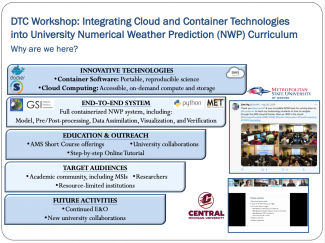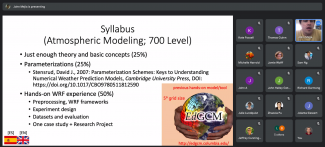The DTC convened a live, virtual three-day workshop 7-9 June 2021 tailored toward university faculty interested in integrating software container and cloud technologies into new or existing Numerical Weather Prediction (NWP) curricula. Of the nearly 40 interested registrants from over 25 different institutions, approximately 16 active participants attended the three-day event. The majority of attendees were either professors of NWP courses or interested in teaching NWP in the future, along with a few industry and researcher participants.
The workshop was inspired by recent partnerships with university programs to incorporate a containerized end-to-end NWP system online tutorial, recently established by the DTC, into their course. The success of these partnerships prompted an eagerness to solicit further input from faculty to enhance and refine the system, based on the needs and constraints of university professors. The goals of the workshop were two-fold; first, to inform the target audience about the tools made available by the DTC and how these technologies have been used in university classrooms; and second, to solicit feedback and facilitate dialogue with faculty about the existing content and how it may be incorporated into their curriculum.
The workshop held a variety of session types to provide a broad spectrum of information and experiences to encourage engagement and thoughtful discussions. The workshop kicked off with an overview of the NWP systems established by the DTC, after which participants were given access to Amazon Web Services (AWS) to practice the online tutorial and become familiar with the containerized NWP system. Additional demonstrations and practice sessions were provided later in the workshop as well, including a focus on modifying and customizing the system. DTC invited two of the participants, Thomas Guinn from Embry Riddle Aeronautical University and John Mejia from the Desert Research Institute, to share an overview of their current NWP coursework to set the stage for opportunities and challenges that exist in current curriculum approaches. Following these presentations, Sam Ng from Metropolitan State University - Denver and John Allen from Central Michigan University gave testimonial talks about their recent experience working with the DTC to incorporate the end-to-end containerized NWP system into their classes, which provided practical examples and experiences to seed further discussion. Additionally, a representative from AWS presented information on the AWS Academy as an opportunity for faculty to train in AWS resources.
At the core of the workshop were the breakout group discussions in which participants had the opportunity to think critically about the feasibility of using this content in their classes, share concerns or limitations, potential solutions, and pose questions to the DTC to consider for future improvements and enhancements. The feedback was quite positive and encouraging; overall, participants realized the benefit of containers and felt the integration into the classroom curriculum can foster excitement for NWP! Some of the specific takeaways and suggestions expressed were :
- Broad interest in using AWS or cloud computing for NWP components, imbuing students with new technical skills (e.g., cloud computing, containers) applicable to non-meteorology jobs as well;
- Need for more options to better align the detail of NWP components, containers, and cloud computing to the appropriate course level and skill sets;
- Desire to coordinate with the DTC to implement NWP containers in class curricula, including getting started with AWS and providing guest lectures;
- Requests for more tutorials, instructional videos, etc., as well as expand case types;
- Recognition of potential hurdles, including heterogeneity of operating systems (e.g. Mac, Linux, Windows) used by students and accompanying user instructions, spin-up time for instructors and students to learn about cloud computing and NWP, and costs associated with cloud computing;
- Excitement for containerized MET and METviewer for easier verification; and
- Interest in participating in an AMS or AGU education conference or short course
For anyone interested in learning more about this effort or potential collaboration, please reach out to Kate Fossell at fossell@ucar.edu. The DTC is looking to connect with interested parties to continue the conversations begun at the workshop and facilitate new collaborations. Those who express interest will be invited to a newly established Slack workspace. Workshop presentations are now available on the workshop website.

